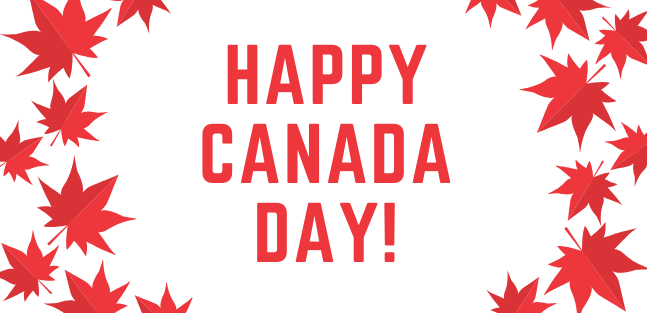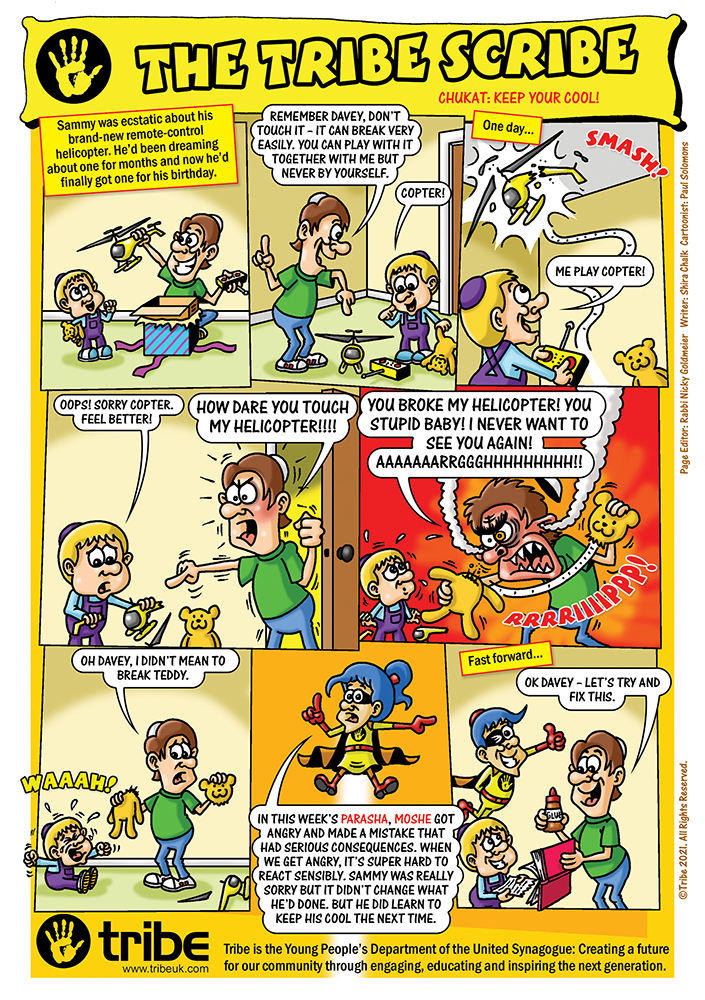Bonjour / Hello [nickname_else_first_name],
Table of contents
1) Perashat Hashavoua - Rabbi Eli Mansour
2) Halakhat Hashavoua (Halakhot related to day to day life) - Hazzan David Azerad
- Amidah
3) Holy Jokes!
4) FOR KIDS!
Fast of the 17th of Tammuz
The 17th of Tammuz is the second of the four fasts commemorating the destruction of the Temple and the Jewish exile in Babylon. It is preceded by the fast of the Tenth of Tevet and arrives three weeks prior to the full-day fast of the Ninth of Av
-Wikipedia


1)PERASHAT HASHAVOUA
This Week's Parasha Insight with Rabbi Eli Mansour
Chukat
In Parashat Chukat, we read about the episode of Moshe Rabenu and the rock, and his subsequent entry denial into the land of Israel. Of course this is one of the more difficult episodes of the Tora to explain and understand. What exactly was the sin of Moshe Rabenu? So, I would like to reference our listeners and readers to Or HaChayim HaKadosh who brings 10 different opinions from the Rishonim, as to exactly what the sin was. Some were as follows:
Some want to say like Rashi, that the sin was that he hit the rock instead of speaking to the rock.
Rav Eliezer said, the hitting was not the problem, but rather the fact that he hit the rock twice.
The Rambam says, the sin was that he got angry.
Others say, that Moshe called the Jewish people rebels.
The Ramban brings down from Rabenu Chanan-El that the sin was that Moshe said ‘Notzeer Lachem Mayin,’ meaning that he himself will bring water out of the rock. Moshe should have said that Hashem will bring forth the water.
Be what it may, Rabbi Gifter A"H, learns from here a very important lesson. This was a good deed that Moshe Rabenu was involved in. He was involved in Chessed, in doing something for the people of Israel. He brought water to millions of people. He brought sustenance to the people so that they can live. So there was no question that it was a Mitzvah. But you see, even in our Mitzvot, we need to scrutinize and get technical and analyze every action and mini-action that makes up the Mitzvah, for we might find that there are deficiencies and problems in our good intentions. In this episode of the rock, it seems on the surface that Moshe Rabenu did a good deed. Moshe seems to be very innocent in this story. However, after looking at it deeper we see how the Rishonim analyzed from every word and from every part of the story, and how they found problems in what took place. The lesson we learn from this, is that it is not enough for us to be vigilant and careful about avoiding sin, but we must also be vigilant and perform Mitzvot very carefully. Many people always think that you have to make Teshuva only for the sins, but here we learn that even our Mitzvot, as the Gemara says, must be analyzed and must be looked at deeply, and we must make sure that the Mitzvah was done with accuracy and in the correct manner.
Furthermore, Rabbi Gifter points out that we can’t have claims on G-d. There are times when G-d forbid things don’t go as we like them to, and things don’t work out as we planned. Sometimes there are bumps in the road, and so we question G-d. We ask why does G-d put the roadblocks, or why doesn’t G-d reward us? We question G-d actions and choices. One can say that he prays, and he gives charity, and he does Chessed, and he learns. So he thinks that he has reason to question G-d. But after we analyze and scrutinize our Tefilot we might see that our prayers were not as good as they should have been, and that our learning was not as consistent as it should have been, and that our charity might have fallen short from our responsibility, as well as our Chessed. In the case of Moshe and the rock, Moshe seemingly did good, but after analysis, we see that there were faults and that his deeds were not perfect. So then all the more so, we must review our own actions and deeds. We need to scrutinize and analyze our Mitzvot, and we should not take it for granted that we are doing the Mitzvah correctly. We have to look deeply into the good deeds that we do, and BiEzrat Hashem (with G-d’s help), we will be rewarded for the good, and BiEzrat Hashem, G-d will overlook our iniquity.
Balak
In Parashat Balak, in Perek 22, pasuk 21, the Torah writes "Vayakom Bilaam BaBoker Vayachavosh Et Atono." It says that Bilaam arose in the morning and he saddled his donkey. And he went with the officers of Moav in order to go curse the Jewish people. Rashi points out that from here you see how hatred disrupts the correct order of things. Bilaam was really not supposed to saddle his own donkey. He was a wealthy man and he had servants and he had slaves, but his anti-Semitism and hatred for the Jews was so strong that he went out of his way and did things out of the norm when he himself saddled his own donkey. It can be compared to the president of the USA putting gasoline into Chopper One or Air Force One before going on a trip. It is not befitting for him. This is what Bilaam did.
So Rashi brings down from the Midrash, that G-d said to Bilaam, "Rasha, Kevar Kademcha Avarahm Aveenu". G-d said to Bilaam; ‘you fool, Avraham the forefather preceded you in this act’, as was said, ‘VaYashkem Avaraham BaBoker VaYachovosh Et Chamoro’, that when Avraham went out to do Akedat Yitzchak, he had saddled his donkey. The point being, that Bilaam was not the first one in this act. Avraham, who was just as rich, did it before.
What does this Midrash mean? What is the significance of the fact that Avraham did it first? What is the connection of Avraham’s saddling of the donkey, to Bilaam’s saddling of the donkey? What is the point that Avraham did it first? Does the fact that Avraham did it first take away from the action of Bilaam?
So the Mefarshim explain that Bilaam was trying to invoke a great Kitrug (prosecution) and claim against the Jewish people. He was leaving on a trip to curse the Jews. So his actions of saddling his own donkey was showing how devoted and strongly he felt about his mission. For a man of stature such as Bilaam, saddling a donkey was a statement and great action. This passionate action of Bilaam was a proclamation of his hatred of the Jewish people. Further, he was comparing is devotion to the hatred of Jews, to the lack of devotion of the Jewish people to Mitzvot. Bilaam was sacrificing his dignity by saddling the donkey. He wanted to prove that his commitment to the hatred of Jews exceeded the commitment of the Jews towards Hashem. He wanted to show that the Jewish people don’t have such passion when it comes to serving G-d. So Bore Olam said to Bilaam; ‘you fool, you are wrong Bilaam, there is no claim against the Jewish people, as simply proven by the actions of Avraham Aveenu.’ Avraham Aveenu saddled his own donkey when going out to do a Mitzvah. Avraham was a wealthy man like Bilaam. And so you see, Bilaam’s entire testimony was invalidated. But, if Avraham Aveenu did not do this already, then Bilaam would have been correct in his declaration.
And that is the important lesson. We can not be less passionate for our religion, than the Goyim are passionate for their frivolity and for their vanity. For example, we see how in the winter time, Goyim sacrifice themselves as they sit at football games in sub-zero weather. They freeze as they watch the game and they even stay longer when it goes into overtime. This is dedication. And then unfortunately we see Jewish people at that same time of year complaining in the Succah, because it might be a little cold or the weather is not 100% perfect. We see Jewish people give excuses why they can’t do Mitzvot because it is too hot or it is too cold. The Goyim never complain when they are at a baseball game and it is 95 degrees. They sit there and sweat it out. But how many Jews would stay and how many would leave early, if the air conditioners would not be working for class in synagogue. We have to look at the Goyim to see how committed they are to their vanities, and we have to be just as committed to the study of Torah. That is the lesson ‘Kevar Kademcha Avraham Aveenu’, that Avraham preceded Bilaam, which means that Avraham had the same vigor and the same passion to the Mitzvot as Bilaam had to Anti-Semitism. And that is the lesson to us. You have to learn from them to learn how to serve Bore Olam.

2) HALAKHAT HASHAVOUA
Halakhot selected and translated by Hazzan David Azerad
Magen Avot – A Concise Recap of the Amida - Peninei Halacha
The Sages ordained that the ĥazan recite the berakha known as “Me’ein Sheva” on Friday night. This berakha is like a ĥazan’s repetition, as it is a synopsis of the seven berakhot of the Shabbat Amidah. The reason for this is that synagogues were (sometimes) built in the fields, and it was dangerous to return home from them at night. The Sages were worried that if one was late or slow and finished his recitation of the Amida after the rest of the congregation, he would have to walk home alone, thus endangering himself. Therefore, they instituted that the ĥazan say this berakha in order to extend the service. This would allow those who fell behind to finish their Amida and return home with the rest of the congregation.
Even though for over a thousand years now synagogues have not been built in the fields, the ordinance stands, and in every synagogue the ĥazan recites this berakha after the Amida. However, if a minyan is convened in a private home, such as for a bridegroom or a mourner, it is not recited, since the ordinance was made only for a synagogue.
Some say, however, that the talmudic Sages had an additional, esoteric rationale: on Shabbat, it is necessary to include something akin to a ĥazan’s repetition even at Ma’ariv. Consequently, the ordinance is not limited to a synagogue, but is relevant anywhere there is a minyan (Ben Ish Ĥai; Kaf Ha-ĥayim). This is the custom of those who regularly follow kabbalistic practices. But the rest of the poskim follow the first approach and maintain that Me’ein Sheva is not recited in a place that does not have a regular minyan. Only in the holy city of Jerusalem do they say Me’ein Sheva even at an impromptu minyan, because the entire city is considered a synagogue.
The Aĥaronim disagree whether the ĥazan must bow at the beginning of Me’ein Sheva. Some say that since this berakha is in lieu of the ĥazan’s repetition, it follows the same rules, and he must bow at its beginning just as he bows at the beginning of the Amida. Others maintain that it is not the same as the ĥazan’s repetition, and thus it is unnecessary for him to bow at the beginning. Sefaradim however have the custom not to bow.
Bevirkat Shabbat Shalom Umevorach
David Azerad
3) HOLY JoKeS!!
Selection of funny snippets, loosely related to this weeks parashah or current events, to brighten your day


Click on the image to open the youtube video

















